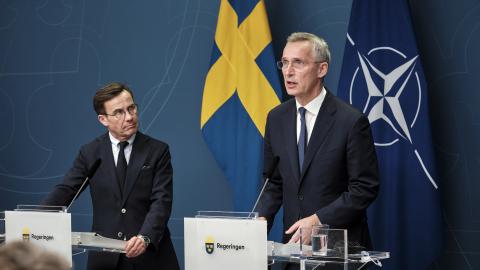Sweden last week cleared the final hurdle along its path toward membership of NATO. After months of delays, Hungarian parliamentarians voted 188 to six in favor of the Scandinavian nation’s entry into the alliance.
Sweden will therefore soon become the alliance’s 32nd member, less than a year after Finland also joined.
In the context of European security, this is a historic event. The Swedish government, backed by the people of the country, made the decision to apply to join NATO soon after Russia launched its large-scale invasion of Ukraine in February 2022, and it came as a surprise to many.
For centuries, Sweden pursued a policy of military nonalignment in Europe. The country stayed out of the First World War and Second World War and pursued a policy of neutrality during the Cold War. Before 2022, there was no serious debate within Swedish politics about the possibility of joining NATO, nor was there any meaningful public support for it.
Attitudes changed almost overnight when Russia invaded Ukraine. Finland and Sweden applied to join the alliance at the same time. Finland’s membership received the green light last spring but Sweden had to wait.
The decision to add new members to NATO must be unanimously agreed by existing member states and Stockholm’s application was first stalled by Turkiye and later by Hungary. Initially, the dispute was over a Turkish demand that Stockholm extradite members of the outlawed PKK, who Ankara accused of terrorism. That matter was resolved and, in January, the Turkish parliament voted to approve Sweden’s membership of NATO.
The reason for Hungary’s opposition was less clear. However, it probably had more to do with internal debates about EU funding allocations than any genuine security concerns.
The addition of Sweden to the alliance will make it stronger for three reasons. Firstly, the nation already takes defense issues very seriously. Due to its nonaligned military status throughout the country’s recent history, it has maintained robust and sizable armed forces.
Sweden also maintains a very productive and proven defense industry that produces some of the best weapons in the world. To help meet NATO defense spending targets in 2024, the country even announced last year that it was boosting defense spending by a staggering 30 percent.
It has also played a leading role in providing economic, humanitarian and military aid to Ukraine. Since February 2022, it has given almost $3.5 billion of assistance to Kyiv.
Secondly, Sweden’s membership of NATO formalizes a relationship that, in practice, has existed for decades. Although Sweden was nonaligned militarily during the Cold War, Stockholm quietly cooperated with NATO on issues of mutual interest.
Arguably, Sweden was the country that enjoyed the closest relationship with NATO without formally being a member of the organization. It also participated in many NATO-led peacekeeping operations.
With the addition of Sweden and Finland to the alliance, the geopolitical reality in Northern Europe has changed.
To this day, Swedish troops continue to be part of NATO’s long-running Kosovo Force mission. The nation’s troops also contributed to the alliance’s 2011 no-fly zone mission in Libya and to its International Security Assistance Force and Resolute Support Missions in Afghanistan.
Thirdly, a NATO that includes Sweden allows the alliance to defend Northern Europe more effectively. The Swedish island of Gotland, which occupies a strategic position in the Baltic Sea halfway between Sweden and Latvia, is a good example of this.
Gotland is one of the most important pieces of territory in Northern Europe and Sweden has maintained a permanent military garrison on the island for hundreds of years. Currently, about 400 soldiers are stationed there. This important location will now be a part of NATO.
Iceland, Norway and Denmark are already in NATO. With the addition of Sweden and Finland to the alliance, the geopolitical reality in Northern Europe has changed.
As Swedish Prime Minister Ulf Kristersson said recently: “For the first time in 500 years, the Nordic countries will have a common defense.”
As circumstances change, NATO needs to adapt and should update its military contingency plans for the region.
NATO members need to increase their naval presence in the Baltic Sea. Other than Russia’s small, albeit important, exclave of Kaliningrad, which is sandwiched between Poland and Lithuania, the Baltic Sea is now effectively a NATO lake.
The alliance also needs to establish a new Northern Europe air defense mission. While the existing Baltic Air Policing mission has been useful for policing the region’s airspace, more needs to be done. With the addition of the new NATO members in the region, combined with the threats emanating from Russia, a robust and expanded air defense mission is needed.
NATO has been one of the most successful defensive alliances in history, so it is no surprise that countries in Europe that are not members want to join. Sweden’s entry is welcome news ahead of the alliance’s major summit this summer, which will mark the 75th anniversary of its founding.
Extending the NATO security umbrella to new members such as Sweden encourages other like-minded countries to coalesce around common defense. Ultimately, this makes Europe more secure. And because NATO is a defensive military alliance, Russia should not fear additional countries joining it.
Sweden’s membership of NATO is also a reminder that the door is open to other new members and should offer hope to other countries that want to join, such as Ukraine, Georgia, Bosnia-Herzegovina and Kosovo.
Even in some traditionally strictly neutral countries, such as Ireland, there have been small, but growing, public debates about the possibility of NATO membership, because of the example set by Sweden.
As a member of NATO, Sweden will be a net contributor to regional security. Unlike some existing members that do not pull their weight, it will not be a burden on the alliance. All in all, its entry into NATO is a much-needed good news story.

















